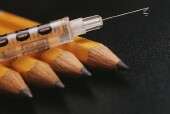More evidence whooping cough protection wanes

(HealthDay)—Despite high levels of vaccination, the rate of whooping cough in the United States is at its highest level in decades, and one reason may be that immunity from the vaccine diminishes each year after the fifth dose is given.
New research from the U.S. Centers for Disease Control and Prevention (CDC) confirms what other recent studies have found: protection against whooping cough wanes significantly between the fifth dose of the vaccine—given sometime during the 4- to 6-year-old age range—and the adolescent booster vaccine given at 11 or 12.
"This study provides fairly strong evidence that the trends we're seeing are real—and a couple of other studies with similar findings have recently come out," said study lead author Sara Tartof, who was at the CDC at the time of the study and is now a researcher at Kaiser Permanente in Los Angeles.
Nonetheless, "the vaccine is still a great tool," she said. "Kids who are fully vaccinated who get whooping cough have a much milder disease than those who aren't vaccinated. Vaccines are still the best protection against disease, and the incidence of whooping cough is low."
Whooping cough, which is also called pertussis, is a highly contagious bacterial disease that attacks the respiratory system. In 2012, the United States had the highest number of whooping cough cases since 1959, according to the CDC. During 2012, the CDC received reports of 41,000 cases and 18 deaths, with most of the deaths occurring in infants.
The whooping cough vaccine also includes immunizations for diphtheria and tetanus. It's given in a five-dose series at 2, 4 and 6 months; at 15 to 18 months; and between 4 and 6 years, according to the CDC. An adolescent booster is recommended between age 11 and 12.
The current study, published online March 11 in the journal Pediatrics, looked at children born between 1998 and 2003 in Minnesota or Oregon who had received the recommended five doses of the vaccine. By using immunization records and comparing them to state health department whooping cough surveillance data for six years following the fifth dose of vaccine, the researchers were able to more accurately track how many fully vaccinated youngsters got the illness, and how much protection the vaccine offered from year to year.
In Minnesota, nearly 225,000 children born during the study period were fully vaccinated. In Oregon, there were about 180,000. In Minnesota, 458 cases of whooping cough were reported; there were 89 reported in Oregon.
The rates of whooping cough rose each year of the follow-up period. During the first year after the final vaccination, the incidence of whooping cough was 15.6 per 100,000 in the Minnesota population. By the sixth year, that rate was 138.4 per 100,000. In Oregon, a similar trend emerged, with a rate of 6.2 per 100,000 in the first year of follow-up and 24.4 per 100,000 in the last year of follow-up.
The authors said many reasons may explain why whooping cough cases are on the rise. One may be that physicians simply are more aware of the disease and may be reporting it more often. Another possible cause is the vaccine itself, they noted.
The current vaccine is an acellular vaccine, which means it doesn't contain whole cells of the bacterium responsible for pertussis infections. The previous vaccine contained whole cells of the bacterium, but was more likely to cause side effects. One of the trade-offs for reducing side effects may be a vaccine that's slightly less effective, said Dr. Kenneth Bromberg, director of the Vaccine Research Center at the Brooklyn Hospital Center in New York City.
"This study adds to the strength of argument that the acellular vaccine doesn't seem to last as long as we might have thought it would," Bromberg said.
Both experts said there are no new whooping cough vaccines currently in development, so for now it's important that everyone get vaccinated: children, teens and adults. The more people who have protection against the disease, the less chance it will have to spread.
That's why the CDC now recommends that pregnant women receive the whooping cough vaccine during the third month of pregnancy, so they can pass protection on to their babies.
More information: To learn more about whooping cough, visit the U.S. Centers for Disease Control and Prevention.
Health News Copyright © 2013 HealthDay. All rights reserved.













